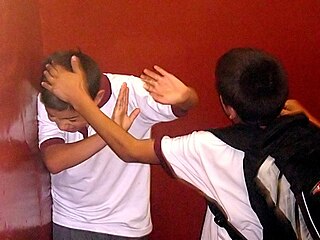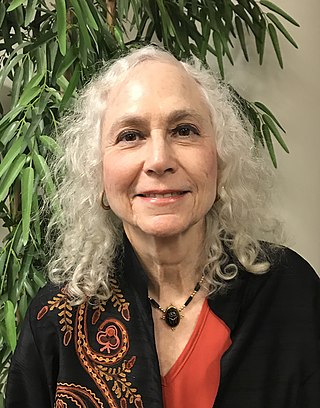Related Research Articles

A mental disorder is an impairment of the mind disrupting normal thinking, feeling, mood, behavior, or social interactions, and accompanied by significant distress or dysfunction. The causes of mental disorders are very complex and vary depending on the particular disorder and the individual. Although the causes of most mental disorders are not fully understood, researchers have identified a variety of biological, psychological, and environmental factors that can contribute to the development or progression of mental disorders. Most mental disorders result in a combination of several different factors rather than just a single factor.

Physical abuse is any intentional act causing injury, trauma, bodily harm or other physical suffering to another person or animal by way of bodily contact. In most cases, children are the victims of physical abuse, but adults can also be victims, as in cases of domestic violence or workplace aggression. Alternative terms sometimes used include physical assault or physical violence, and may also include sexual abuse. Physical abuse may involve more than one abuser, and more than one victim.

Child abuse is physical, sexual, and/or psychological maltreatment or neglect of a child or children, especially by a parent or a caregiver. Child abuse may include any act or failure to act by a parent or a caregiver that results in actual or potential harm to a child and can occur in a child's home, or in the organizations, schools, or communities the child interacts with.

Complex post-traumatic stress disorder (CPTSD) is a stress-related mental disorder theoretically happening in response to complex traumas, i.e. generally prolonged or repetitive exposures to a series of traumatic events, within which individuals perceive few or no chance to escape.
Emotional dysregulation is a range of emotional responses that do not lie within a desirable scope of emotive response, considering the stimuli.
Childhood trauma is often described as serious adverse childhood experiences (ACEs). Children may go through a range of experiences that classify as psychological trauma; these might include neglect, abandonment, sexual abuse, emotional abuse, and physical abuse, witnessing abuse of a sibling or parent, or having a mentally ill parent. These events have profound psychological, physiological, and sociological impacts and can have negative, lasting effects on health and well-being such as unsocial behaviors, attention deficit hyperactivity disorder (ADHD), and sleep disturbances. Similarly, children with mothers who have experienced traumatic or stressful events during pregnancy can increase the child's risk of mental health disorders and other neurodevelopmental disorders. Kaiser Permanente and the Centers for Disease Control and Prevention's 1998 study on adverse childhood experiences determined that traumatic experiences during childhood are a root cause of many social, emotional, and cognitive impairments that lead to increased risk of unhealthy self-destructive behaviors, risk of violence or re-victimization, chronic health conditions, low life potential and premature mortality. As the number of adverse experiences increases, the risk of problems from childhood through adulthood also rises. Nearly 30 years of study following the initial study has confirmed this. Many states, health providers, and other groups now routinely screen parents and children for ACEs.
Child neglect, often overlooked, is the most common form of child maltreatment. Most perpetrators of child abuse and neglect are the parents themselves. A total of 79.4% of the perpetrators of abused and neglected children are the parents of the victims, and of those 79.4% parents, 61% exclusively neglect their children. The physical, emotional, and cognitive developmental impacts from early childhood neglect can be detrimental, as the effects from the neglect can carry on into adulthood.
Donald Jay Cohen was an American psychiatrist, psychoanalyst, and director of the Yale Child Study Center and the Sterling Professor of Child Psychiatry, Pediatrics and Psychology at the Yale School of Medicine. According to the New York Times, he was "known for his scientific work, including fundamental contributions to the understanding of autism, Tourette's syndrome and other illnesses, and for his leadership in bringing together the biological and the psychological approaches to understanding psychiatric disorders in childhood"; his work "reshaped the field of child psychiatry". He was also known as an advocate for social policy, and for his work to promote the interests of children exposed to violence and trauma.

Dante Cicchetti is a developmental psychology and developmental psychopathology scientist, specializing in high-risk and disenfranchised populations, including maltreated children and offspring of depressed parents. He currently holds a joint appointment in the department of psychiatry at the University of Minnesota Medical School and in the Institute of Child Development. He is the McKnight Presidential Endowed Chair and the William Harris Endowed Chair.
Sheree Toth is a professor of psychology at the University of Rochester, as well as an associate professor of psychiatry and the executive director of the Mt. Hope Family Center. She works in the field of developmental psychopathology, especially concerning maltreated children.
Carolyn M. Mazure is an American psychologist and the Norma Weinberg Spungen and Joan Lebson Bildner Professor of Psychiatry and Psychology at the Yale School of Medicine. She created and directs Women’s Health Research at Yale — Yale’s interdisciplinary research center on health and gender.

Cathy Spatz Widom is a psychologist and professor known for her research in the fields of early childhood abuse and neglect. She has received the AAAS Prize for Behavioral Science Research in 1989, the Edwin H. Sutherland Award in 2013, and the Stockholm Prize in Criminology in 2016. She was co-editor of the Journal of Quantitative Criminology from 2010 to 2013. Widom has conducted research to determine the long term consequences of early childhood physical and sexual abuse and child neglect.
Early childhood trauma refers to various types of adversity and traumatic events experienced during the early years of a person's life. This is deemed the most critical developmental period in human life by psychologists. A critical period refers to a sensitive time during the early years of childhood in which children may be more vulnerable to be affected by environmental stimulation. These traumatic events can include serious sickness, natural disasters, family violence, sudden separation from a family member, being the victim of abuse, or suffering the loss of a loved one. Traumatic experiences in early childhood can result in severe consequences throughout adulthood, for instance developing post-traumatic stress disorder, depression, or anxiety. Negative childhood experiences can have a tremendous impact on future violence victimization and perpetration, and lifelong health and opportunity. However, not all children who are exposed to negative stimuli in early childhood will be affected severely in later life; some children come out unscathed after being faced with traumatic events, which is known as resilience. Many factors can account for the invulnerability displayed by certain children in response to adverse social conditions: gender, vulnerability, social support systems, and innate character traits. Much of the research in this area has referred to the Adverse Childhood Experiences Study (ACE) study. The ACE study found several protective factors against developing mental health disorders, including mother-child relations, parental health, and community support. However, having adverse childhood experiences creates long-lasting impacts on psychosocial functioning, such as a heightened awareness of environmental threats, feelings of loneliness, and cognitive deficits. Individuals with ACEs are more prone to developing severe symptoms than individuals in the same diagnostic category.
Adverse childhood experiences (ACEs) encompass various forms of physical and emotional abuse, neglect, and household dysfunction experienced in childhood. The harms of ACEs can be long-lasting, affecting people even in their adulthood. ACEs have been linked to premature death as well as to various health conditions, including those of mental disorders. Toxic stress linked to child abuse is related to a number of neurological changes in the structure of the brain and its function.

Kathleen Ries Merikangas is the Chief of the Genetic Epidemiology Research Branch in the Intramural Research Program at the National Institute of Mental Health (NIMH) and an adjunct professor of epidemiology at the Johns Hopkins Bloomberg School of Public Health. She has published more than 300 papers, and is best known for her work in adolescent mental disorders.
Barbara L. Bonner is a clinical psychologist and expert on juvenile sex offenders. She is known for her research on the assessment and treatment of abused children, prevention of child fatalities due to neglect, and treatment of children and adolescents with problematic sexual behavior. Bonner is the CMRI/Jean Gumerson Endowed Chair and Professor of Pediatrics at the University of Oklahoma College of Medicine. She serves as the Director of the Child Abuse and Neglect at the University of Oklahoma Health Sciences Center.
Una D. McCann is a board certified psychiatrist and researcher at Johns Hopkins School of Medicine in the Department of Psychiatry. She is also the Director of the Anxiety Disorders Program, and Co-Director of the Center for Interdisciplinary Sleep Medicine and Research, and Associate Program Director at the Johns Hopkins Bayview Medical Center. McCann is considered to be an expert in anxiety and stress disorders and her primary areas research revolves around amphetamine-induced monoamine neurotoxicity and neurobiology of anxiety disorders.
Joy D. Osofsky is a clinical and developmental psychologist, known for her research on infant mental health, how parents nurture their infants and children, and the repercussions that follow exposure to traumatic events and violence. Some of her notable work has examined the aftereffects of Hurricane Katrina, experiences of children raised in broken households, and the impact of the COVID-19 pandemic on communities. Osofsky is Professor of Pediatrics, Psychiatry, and Public Health, and Head of the Division of Pediatric Mental Health at the Louisiana State University School of Medicine, and holds the Barbara Lemann Professorship of Child Welfare at LSU Health New Orleans.
Jodi Anne Quas is an applied developmental psychologist who is known for her work on how maltreatment and abuse affect memory development and children's ability to give eyewitness testimony after experiencing trauma. She holds the position of Professor of Psychological Science and Nursing Science at the University of California, Irvine School of Social Ecology.
Rebecca Jean Moellman-Landa is an American speech-language pathologist specializing in neuropsychology and autism research. She is the founder and director of the center for autism and related disorders at the Kennedy Krieger Institute. Landa is a professor of psychiatry and behavioral sciences at the Johns Hopkins School of Medicine.
References
- 1 2 3 "Joan Kaufman, Ph.D., Professor of Psychiatry and Behavioral Sciences". Johns Hopkins Medicine. Retrieved 2023-02-08.
- ↑ Kaufman, Joan Robin (1990). Depressive disorders in maltreated children (Ph.D. thesis). Yale University.
- 1 2 3 4 "Joan Kaufman". medicine.yale.edu. Retrieved 2023-02-08.